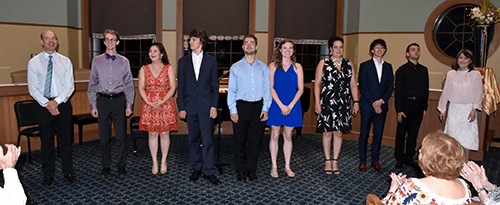by Rory O’Donoghue

Following an admirable performance of Chopin’s Nocturne, Op. 55, No. 2 by pianist Pierre Desangles, Artistic Director Jodi Kanter announced that the evening’s titular offering, Rachmaninoff’s piano arrangement of Mendelssohn’s “Scherzo” from A Midsummer Night’s Dream, would not be performed. The palpable disappointment in the room dissipated almost as soon as cellist Daniel Kaler’s bow hit the string for Glazunov’s Minstrel Song, which he treated with wide, lush vibrato and a wonderful sense of rubato. He brought the same sensitive timing and superior intonation to Tchaikovsky’s Pezzo Capriccioso. Both selections featured attentive accompaniment by Arseniy Gusuv.
Soprano Jung Euh Oh approached Franz Lehar’s “Vilja” from The Merry Widow with lustrous, velvet tone, regaling in its florid nostalgia. Followed closely by pianist John Simmons, her voice shimmered with color at each of her different dynamic levels, and she demonstrated impressive breath control on the prolonged high note at the end. Oh’s performance prompted Thornton to wax poetic on the importance of playing instrumental music as if singing, an attitude which he brought to the “Allegro moderato” from Chopin’s Cello Sonata in g. His unflinching interpretation juxtaposed brash, dramatic moments with lovely, inward pianissimos, and his biting tone brought an interesting quality to the music.
Next up was an enjoyable foray into woodwind music with two movements from Mozart’s Oboe Quartet performed by oboist Eric Juneau, violinist Alexandra Switala, violist Micaela Murphy, and cellist Daniel Kaler. Following the sweet, carefree atmosphere of the Mozart, the “Allegretto-Adagio” from Shostakovich’s Piano Trio No. 2, was all the more sinister, and it was spectacular. Switala sounded phenomenal, attacking everything from the quiet pizzicatos to the brazen loud music with an arresting, incisive tone, and she shaped each note with both beauty and grit. Cellist Brendan Phelps responded in kind, matching Switala in intensity, and Guzuv rounded out the trio with thoughtful piano playing.
Though a little fast, pianist Nikolay Pushkarev’s take on Liszt’s Transcendental Etude No. 5: Feux follets was marked by a fluid, restless touch, but unfortunately ended chaotically with the ringing of a loud cell phone in the front row of the audience.
As any good cabaret should, the concert ended with song. Oh returned with soprano Natasha Ospina-Simmons for Mozart’s delightful “Canzonetta sull’aria” from The Marriage of Figaro, which the two sang as if walking through a forest enjoying a soothing zephyr. Oh once again milked the high notes on Puccini’s “Quando m’en vo” from La bohème, which was sublime. She was a nuanced Musetta, embracing the aria’s superficial quality while also communicating more complicated underlying emotions. She held the final high b with calm control, delivering the goods on this showpiece. Natasha Ospina-Simmons ended the evening with a theatrical “Art is calling for me” from The Enchantress by Victor Herbert. Joined by John Simmons on piano, she had fun with it and hammed it up, making for a rousing conclusion.
Published on ClevelandClassical.com July 29, 2019.
Click here for a printable copy of this article



